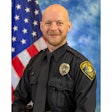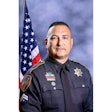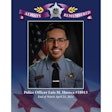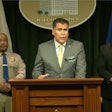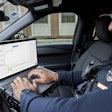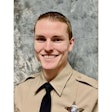On the morning of Tuesday, September 11, 2001, shortly after eight in the morning, I transmitted a tone and announced a third alarm for the borough of Manhattan, N.Y. The call was initially reported as a high-rise fire in the World Trade Center tower 1. At this time, it was unconfirmed that a plane had stuck the building.
While en route to the scene, a fifth alarm was transmitted for the high-rise fire. Shortly after the fifth alarm was announced over Manhattan, a "Mayday" was yelled by the incident commander, who stated, "Another plane just hit tower #2." A fifth alarm was transmitted immediately for tower 2. At this time, all Metro Fire units en route to the scene knew that we weren't going to an accident.
All entrances and exits to the borough of Manhattan had been shut down. We were authorized emergency personnel and proceeded through the Holland Tunnel with the Jersey City Fire apparatus. All of us knew the magnitude of this incident would bring an unimaginable amount of apparatus to the scene, so we parked eight or ten blocks away in front of the NYPD 1st Precinct.
Walking into the scene was unreal. Crowds of people in the street were looking up as if they were watching Godzilla walk down the block, crushing cars in his path. Police officers made a path through the people for emergency apparatus. As we walked, getting closer, pieces of the building were sill falling. People were screaming and crying. Everyone was in shock.
We began taking photos. Our original reason for going to this job had been to document it since there would be so many people working.
Then we heard the sound. Tower 1 began to crack at the seams from the heat caused by the jet fuel fire. Then we heard it: the snap. The last straw breaking. There was no time to think, just time to run. We couldn't even take photos. We were running for our lives.
We dove behind a building only a block away and hid as the debris came flying past us like an avalanche. There was screaming over Metro Fire 1 radio during the wild run, and, frankly, we were amazed we made it out. We had been literally under the tower when we heard the noise, debris falling at our feet behind us. Looking back on the TV stations when we got home, it was like watching the whole thing in "mute" without the screams and the sound of 110 stories crashing to the ground.
The cloud started to drop down after the crash and most of the debris was already on the ground as we started to make sure everyone in the area was OK. We started documenting the area with photos and updating the other Metro Fire units and receivers with what we were seeing. We were moving when we could, hampered by clouds of smoke in our way. When we turned the corner, we found the initial response staging area. All the vehicles in the area were crushed, burning, windows were blown out and everything was covered in debris. It was like a war zone photo.
We had no time to take pictures. We immediately began washing off firefighters who couldn't breathe because they were covered in debris and ash. After we rehabbed those in the area, we started putting out numerous debris fires with fire extinguishers. Then we heard it again. The same terrifying cracking sounds we had heard with tower 1. Tower 2 was coming down and we couldn't believe it. Then we heard that snap, as the entire top, antenna and all, imploded on itself and came crashing down. We had no place to go this time.
We dove through a door into a nearby bagel store. Unfortunately, it had glass windows so we then had to dive over the counters to get into the rear of the building. When we realized the windows were still intact, Dave, from Unit 18, immediately opened the door and yelled out to the emergency workers trapped in the smoke and ash. Coming in one after the next, they were each covered in ash and unable to breathe. We turned the bagel store into an emergency rehab/treatment area and started hosing off everyone coming in.
Once the area we were in was stabilized, we returned to the "war zone" to re-evaluate. We updated Metro as soon as we could and got right back to putting our even more fires and dodging exploding car fires. We photographed what we could, when we could. Engine 33, which was the primary engine company hooked into a hydrant in our area, had no water pressure.
We immediately rushed to the Hudson River, two blocks down, to await the arrival of Marine 6, which we heard was on the way. Once they arrived, we stretched a 3" hose from the river all the way to the scene, recruiting bystanders to help. After they started a good water supply, we resumed our mission of photographing and providing detailed information over the radio system.
This was almost more than a human being could take but I saw hundreds of cops, firefighters, emergency services workers and just plain citizens giving their all. As time passes I'm sure we'll learn hundreds of heroic stories. On that day, I saw heroes in action and they were all around me.
Michael Coppola is a police officer, volunteer firefighter and EMT. He is also a member of Metro fire Radio, a private organization that supplies volunteer communications during times of disaster or public emergency (www.metrofire.com).








